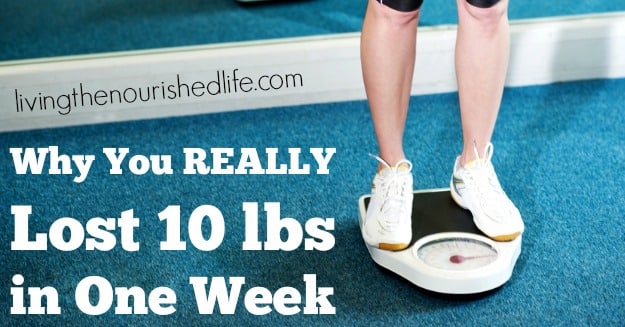You need to know why you REALLY lost 10 lbs in one week–your health and your sanity depend on it! Here’s what’s really happening when you see that scale drop…
READ THIS FIRST: Please read through the comment section for some good back-and-forth about this topic. This post doesn’t cover all possible scenarios (even some where losing 10 lbs in a week isn’t actually so bad). Don’t miss out on the great discussion below!
Yay! You did it. You spent a week eating only cabbage soup and lemonade (or was it eggs and chicken breasts?)–and now you’re reaping the rewards.
You step on the scale and WOW, you really lost 10 lbs in one week. The diet book was right! The fat is melting off you… or is it? You may like the number on the scale, but the tale it tells is not a success story. In fact, it’s a serious warning sign from your body.
What are You Really Losing on that Diet?
Nope, it wasn’t all fat. I won’t lie and say none of that weight was fat–but it’s probably a lot less than you think. Just to run the numbers, a pound of fat equals about 3,500 calories.
So even if you’re only eating 800 calories a day for one week (which is HALF of what an average woman IN A COMA needs to maintain proper body functions), you’re not likely to burn more than about 2-3 lbs of actual fat. So where’s the rest coming from? Here’s what really changed the weight on the scale:
1. Water
We can’t live without it, but it’s the first thing the body flushes down the toilet (literally) when we go on a crash diet. Crash diets cause our stress hormones to soar sky high, which in turn leads our bodies to dump water like Niagara Falls.
2. Glycogen
This is similar to water weight, and the two go hand in hand. In very basic terms, glycogen is basically stored glucose, or sugar. (Yes, in spite of what you may have heard, your body does store sugar for energy, not just fat).
This glycogen is very easy for the body to access–in fact, you are burning glycogen between meals, during heavy exercise, and all night long while you sleep. Well, when you crash diet, glycogen is the easiest way for your body to get some energy, and it will consume it all very quickly since you’re simply not eating enough to sustain yourself.
Glycogen is stored with water, so using glycogen can cause quite a bit of water loss. Between water and glycogen, your body can easily shed several pounds in just a few days without burning off an ounce of fat. It makes the scale move, though, so if all you care about is a number then it might make you (temporarily) feel happy.
3. Muscle
High stress hormones help the body access protein stores for quick energy. Not only can your body use the protein as protein is normally used in the body, but it can also break it down into sugar (aka energy) to use while you’re busy depriving yourself of energy from your diet. In the face of starvation (aka crash diets), your body is going to access this protein more readily than it will your body fat.
4. Bone
Yup. Crash diets are linked to higher “bone turnover” — basically your body is pulling nutrients from your bones during a crash diet. This can actually increase your risk of fractures! Scary stuff. If you want strong bones, crash dieting is not the way to go.
What else are you losing when you lost 10 lbs in one week?
When you lost 10 lbs in one week, it doesn’t even take into account the mineral loss that often comes with flushing so much water out of your system–precious electrolytes like magnesium and potassium usually take the plunge, too, which can leave you feeling a little lifeless.
Not to mention the things that are harder to quantify–like your dignity, your self-worth, your body image. Usually these take a serious hit when you subject your body to torture crash diets all in the name of a smaller swimsuit.
Related: How I Finally Stopped Binge Eating
By the Way, Those Aren’t Detox Symptoms
A lot of these popular crash diets masquerade as “cleanses” and “detox diets” that are supposed to rid your body of toxins. Then they claim the headaches, fatigue, and general moodiness are symptoms of your body “cleansing” itself.
Don’t be fooled. These are symptoms of starving yourself. These are symptoms of your body coping with a sudden drop in energy intake. Because the only thing important during a famine (and yes, your body sees a “cleanse” as a famine) is keeping you alive–your body doesn’t care if you have a headache, feel dizzy, and don’t want to get out of bed during a famine.
In fact, its chief concern at that moment is conserving energy as much as possible. Sort of the opposite of what you want if your goal is to lose weight.
The Moral of the Story: When You Lost 10 lbs in One Week…
Crash dieting is a miserable experience. It’s also pointless. You’re suffering a lot, getting nowhere, and probably setting yourself up for failure (and even more serious problems). Skip the crash diets.
Do this instead: Eat balanced. Have dessert. Live healthy. Move your body. Smile. Take a walk in the sunshine. Give your body energy (you know, that stuff called food)–it will thank you in so many ways.
If you like this post, you might also enjoy reading my books The Nourished Metabolism (all about living a healthy, balanced life that promotes metabolic health) and Love Your Body (to help you break free from body hate).
NOTE: Please read the comment section for some good back-and-forth about this topic of when you lost 10 lbs in one week. This post doesn’t cover all possible scenarios (even some where losing 10 lbs in a week isn’t actually so bad). Don’t miss out on the great discussion below!
References:
More Articles on a Nourished Metabolism and Dieting:
- I Stopped Dieting 6 Years Ago, and This Happened…
- How to Stop Binge Eating
- Stop Dieting: Why Giving Up on Dieting Isn’t Giving Up On Yourself
- 7 “Healthy” Habits that Stress Your Metabolism


